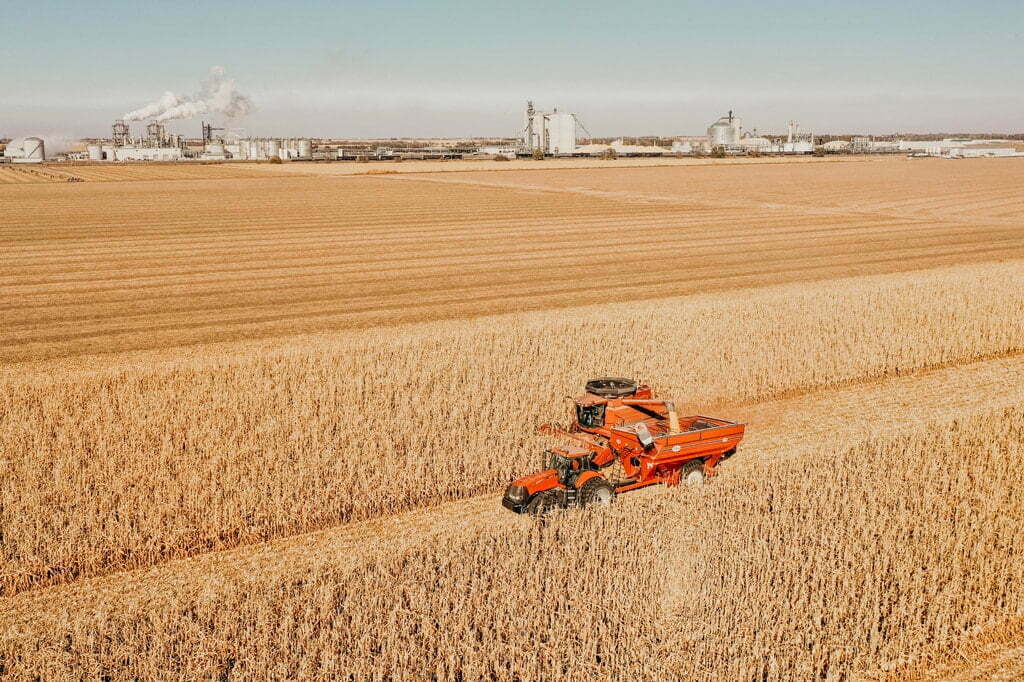In 2021, the U.S. Department of Agriculture’s National Agricultural Statistics Service (NASS) reported farmers experienced a near-record high for corn production. U.S. growers produced 15.1 billion bushels, NASS said, which is the second-highest production on record.
What will happen to all that corn? The USDA Economic Research Service says approximately 40% of it will be used to produce ethanol. Ethanol is a renewable, clean-burning fuel that can be blended with gasoline to help reduce greenhouse gas emissions from vehicles.
In Nebraska, we’re doing our part to produce clean fuels. We’re the nation’s second-largest ethanol producer, generating approximately 2.5 billion gallons each year.
Let’s review how ethanol helps reduce these emissions and why it’s a smarter choice for the environment.
What Are Greenhouse Gas Emissions?
Greenhouse gases are atmospheric gases like water vapor, carbon dioxide, and methane that trap heat from the sun. Burning fossil fuel for electricity, heat and transportation has increased the levels of these gases, according to the EPA, which has contributed to a rise in the Earth’s average temperature and changing weather patterns.
In recent years, transportation has become one of the largest sources of greenhouse gas emissions.
Studies: Ethanol Reduces Greenhouse Gas Emissions
When it comes to reducing transportation’s impact on the environment, corn-based ethanol is key. Corn helps to recycle carbon dioxide by absorbing it as it grows and then releasing it as the fuel burns.
Multiple studies have shown ethanol diminishes greenhouse gases and other particulates emitted by vehicles. These studies include:
- S. Department of Energy’s Argonne National Laboratory, which studied corn ethanol production as it quadrupled in the United States from 2005-2019. Researchers analyzed ethanol’s greenhouse gas emission intensity and found a 23% reduction. The study was conducted again in subsequent years, and found ethanol now has 44-52% lower greenhouse gas emissions than regular gasoline. In a separate study in 2019, the USDA found ethanol refined at natural gas-powered refineries reduced greenhouse gas emissions to 43% lower than gasoline. Researchers at Harvard, MIT and Tufts came to similar conclusions, finding a 46% decrease in emissions.
- Swiss Federal Laboratory, which studied the use of ethanol blends like E10 and E85 in a flex-fuel vehicle in 2016. E10 contains up to 10% ethanol, while E85 contains up to 85% ethanol. Flex-fuel vehicles are capable of running on gasoline blends containing higher concentrations of ethanol. The study found that using E10 and E85 reduced particulate matter emissions by more than 95%.
As technology evolves, researchers are expecting ethanol to further reduce emissions. The Renewable Fuels Association says these technologies could reduce emissions by as much as 70% in the coming years. Already, ethanol made from corn kernel fiber is reducing greenhouse gas emissions by 80% or more.

How Ethanol Has Reduced Greenhouse Gas Emissions and Promotes Clean Air
The Renewable Fuels Association says using ethanol and other biofuels has reduced transportation-related greenhouse gas emissions by 980 million tons since 2008. In 2021, emissions were reduced by 54.5 million tons.
Besides reducing greenhouse gas emissions, ethanol also cuts down on other harmful pollutants, like:
- Carbon monoxide—This harmful gas reduces your body’s effectiveness to deliver oxygen to organs. The EPA says corn ethanol reduces carbon monoxide emissions by 35%.
- Nitrogen oxide—These gases react with other pollutants to form smog, which can trigger asthma attacks, respiratory problems, and heart disease. The EPA reports corn ethanol reduces nitrogen oxide emissions by 10%.
- Particulate matter—These lurk in vehicle exhaust and can cause respiratory problems and heart disease. The EPA says corn ethanol reduces particulate matter emissions by up to 35%.
- Volatile organic compounds—These can damage the liver, kidney and central nervous system. The EPA reports corn ethanol reduces volatile organic compound emissions by 15%.
So, not only is corn-based ethanol a smarter choice for the environment, it’s also a healthier one for you and your family. Most drivers are already using ethanol-blended fuels. In fact, any cars manufactured in 2001 or more recently will have the capability to do so! Just make sure to check your owner’s manual. The next time you visit the gas pump, you can do your part to help minimize greenhouse gases.
Related Posts
Leaving city life behind, a young farmer cultivates community and conservation for generations to come.
Growing up in northwest Omaha, Morgan Wrich watched as the quiet cornfield behind her elementary school gave way to a concrete parking lot and a bustling Lowe’s, a clear sign of the city’s rapid growth. [...]




